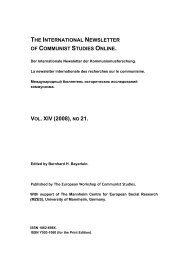11RXNdQ
11RXNdQ
11RXNdQ
You also want an ePaper? Increase the reach of your titles
YUMPU automatically turns print PDFs into web optimized ePapers that Google loves.
From one China to another* 5<br />
stops and looks at a bundle of material at his feet. In China, you know, when a child dies,<br />
it is wrapped in a red sheet and abandoned during the night in a corner. In the morning,<br />
the refuse carts take it off to the communal grave. And there is Barrès, quite moved. How<br />
could he fail to be moved by this quaint custom? And what pure artistic pleasure he takes<br />
looking at these little scarlet marks, which, lively and bright, set off the grey of the dawn.<br />
Nearby someone has left a dead cat. A dead cat, a dead kid: two little souls, two little<br />
ripples. Barrès brings them together in the same funeral orison and then moves on to<br />
more distinguished comparisons. At that same hour perhaps, wrapped in purple silk, the<br />
beautiful, warm body of a concubine is being carried to the imperial bed. A small warm<br />
body, a small cold body; on each of them, the same bloodstain. And there we are: blood,<br />
voluptuousness, death. Lucky Barrès; he in turn died, taking to the grave the secret of a<br />
clear conscience. We, however, have seen children die like rats in the bombing raids or<br />
the Nazi concentration camps; when, against a splendid backdrop of red earth and palm<br />
trees, we are shown flies eating the eyes of new-born babies, we look away with a guilty<br />
conscience. Try and explain that! One day, in a back-street of Naples, the stable door of a<br />
dark cavern opened; on a huge double bed a tiny, lost, six-month-old baby was lying; it<br />
appeared made-up, its face wrinkled like a piece of cloth. It could easily have been<br />
mistaken for the 90-year-old cardinal who had said mass at Saint Peter’s on the previous<br />
Sunday. The baby was dead. Seeing this indiscreetly displayed Neapolitan death once<br />
was enough for me. I feel incapable of appreciating fully the poetic shrouds of the poor<br />
Chinese babies; I look through them and make out a wrinkled face, too young even to be<br />
childlike. We must have become insensitive: the thought of evoking the silk shawl, the<br />
silky skin of the beautiful Tseu-hi does not cross our minds. We content ourselves with<br />
thinking that we must prevent children from dying. And before this murdered infant,<br />
rejected waste of the Kuomintang, we wish for the victory of the Eighth Army. This<br />
album is an announcement; it announces the end of tourism. It gently teaches us, without<br />
useless pathos, that poverty has lost its picturesque quality and will never recover it.<br />
Poverty is there, however, unbearable and discreet. On every page it manifests itself, in<br />
three elementary actions: carrying, scavenging, pilfering.<br />
In all the capitals of poverty, the poor carry bundles. They always keep them close by.<br />
When they sit down, they place them by their side and watch over them. What do they<br />
put in them? Everything: wood gathered in a park, hastily, crusts of bread, bits of wire<br />
pulled off a fence, scraps of cloth. If the bundle is too heavy, they drag it along, in<br />
wheelbarrows or handcarts. Poverty always seems to be doing a moonlight flit. In Peking,<br />
Shanghai, Nanking everyone is pulling or pushing: here men are straining to make their<br />
cart go forward; there they are on a bridge; the road climbs; they must struggle twice as<br />
hard; there are urchins about, always ready to help for a hand-out. Like the unemployed<br />
man in Deux Sous d’Espoir who positions himself halfway up a hill and pulls the carriage<br />
horses by the bridle. The tall building in the background is a lighthouse. At the top of the<br />
lighthouse is the eye of the West; its revolving gaze sweeps across China. The top three<br />
levels have been reserved for foreign press correspondents. How high up they are! Much<br />
too high to see what is happening down below. They dance high in the sky with their<br />
wives and mistresses. Meanwhile, at ground level, the porters push their carts and Chiang<br />
Kai-shek is being defeated by the communist armies. The Americans see neither the little<br />
flat dwellings of China nor the armed peasants nor the porters. Yet the porters have only




